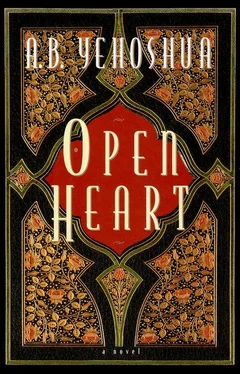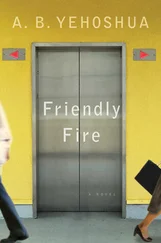Toward the end of the meal, when the bride-to-be, Hadas — a vivacious, good-natured girl, with a fresh, wholesome look about her — arrived and shook the snowflakes gracefully off her hair, Eyal’s mother retired at last to her room and left us alone. I made up my mind not to say any more to Eyal, who immediately began questioning me again about the “married woman,” who had apparently sparked his imagination. Hadas, who radiated goodwill toward me, was surprisingly well informed about my trip to India. It turned out that the shaven-headed girl, Michaela, who had brought the news of the hepatitis to the Lazars and whom I had taken at first for a boy, was from the same kibbutz as Hadas. I stood up suddenly, though I had planned to leave, as if thrown off balance by the excitement caused by the discovery of this unexpected coincidence. I wondered whether I should go to Eyal’s mother’s room to say good-bye and thank her for her hospitality or leave her to rest. Eyal, maybe eager for me to leave, stood up and said, “So, Benjy, don’t say it’s too far for you to come to Ein Zohar for our wedding.”
“Have you already set a date?”
“Of course,” they chorused, and they told me the exact date and made sure that I wrote it down in my calendar, and that no night shift in the world would prevent me from being there. Then Eyal insisted that I go in and say good-bye to his mother, who was so fond of me; why not give her a little pleasure? I followed him cautiously into the large, dim room, where we had played when we were children and where she was lying, large and very white, covered only by a sheet, which revealed how much weight she had put on in the past year. “Benjy wants to say good-bye to you,” whispered Eyal, gently waking her up. “Yes, I wanted to say good-bye to you,” I said, “and also to thank you for the meal, which was even more delicious than usual.” But she didn’t smile at me, she only nodded her head and said, “Give my regards to your parents, and don’t forget to come to Eyal’s wedding. It’s important for you to be there, not only for our sakes but also for yours.”
“I’ll be there, I promise,” I said, and to reinforce my promise I put both my hands together over my heart in the Indian salutation.
I had every intention of going to the wedding. Eyal had been my best friend since we had been in school, after all. But in truth, I also held out hope that the boyish Michaela, a friend of Eyal and his future bride’s, might be there, and perhaps through her I’d be able to make indirect contact with Einat, and through her with her parents, in case my connection with Lazar proved shortlived. As I strolled down the Jerusalem street, marveling at the great heaps of snow piled up along the sidewalks, the pleasant feeling did not leave me, nor did the mild envy I felt at Eyal’s approaching marriage, nor the thought that any hopes of my own in that direction would have to be postponed for the time being owing to my feelings for Lazar’s wife. Nothing could stop me from wishing to let myself go on falling into the abyss of the sweet new feeling. I got home and told my parents, who were waiting for me with their usual eagerness, that the roads were now free of snow and there was nothing to prevent me from returning to Tel Aviv; they knew very well that I had to get back to the hospital in order to fight for the continuation of my residency in the surgical department. My father suddenly burst out with uncharacteristic vehemence, “Why do they leave it up to Professor Hishin to decide by himself who to keep on in the department and who not to keep on? In these matters there are always hidden motives at work, and perhaps precisely — listen to me for a minute before you jump in with a ready retort — perhaps precisely because you’re so hardworking and dedicated he wants to push you out. Why don’t they let other people in the department decide? It’s not only nimble fingers that count, but also loyalty and dedication, like you’ve given the hospital over the past year. Why don’t they remember that?” It was hard for me to hear my father talking like this, perhaps because I felt the same smarting injustice. “But, Dad,” I said, trying to calm him down, “you’re talking as if it’s the only hospital in the world. I can find a place at another hospital in Tel Aviv.”
“Not on the same level as the one you’re at now,” he pronounced, and he was right. “So maybe I’ll come back to Jerusalem,” I said. “To Jerusalem?” said my father in disgust. “You’re thinking of returning to Jerusalem and perhaps coming back to live at home? Then you’ll really never get married.” I burst into strange laughter. It had never occurred to me that my father too was worried by my single state. Now my mother broke her glum silence. “Don’t keep him,” she scolded my father. “It gets dark quickly. He should leave while it’s still light.” But my father grabbed hold of my shoulder. “Listen to me, Benjy, you fight for your place. Now you’ve got allies with influence in the hospital — Lazar and his wife.”
“What’s his wife got to do with it?” I asked in pretended surprise. “What has she got to do with the hospital?”
“She’s got something to do with Lazar,” my father insisted, “and he might be able to provide an additional post in the surgical department for you. He saw what a good doctor you are if not for you, they would still be stuck in India with a dying girl.”
“Nonsense,” I said, “you’re exaggerating. All I did was perform a simple blood transfusion.”
“I don’t interfere in matters I’m not an expert in,” said my father, “but listen to me. They haven’t paid you anything yet?”
“Not yet,” I said apologetically. “They didn’t have a chance; we said good-bye at the airport.”
“Never mind, it doesn’t matter,” explained my father. “They don’t have to pay you. All they have to do is keep in touch and help you stay on at the hospital, so that you can stay in Tel Aviv, a town with a bit of life in it, at least.” And he turned a wonderful, tired smile on me, illuminated by the bright blue of his eyes, trying to soften his words, because he knew very well that all his anger stemmed from his dream of returning, when he retired, from his Jerusalem exile to live near me in Tel Aviv.
My mother looked out the window and raised her eyes worriedly to the sky, as if to keep the blue expanse from clouding up. “If you’ve made up your mind to go back today, then you should start now,” she urged me, using her common sense. I went into my room and saw that my bags were ready, crammed with freshly laundered clothes and underclothes, and peeping out of one of them I saw a tin of the Scottish shortbread I had loved as a child, which my mother continued to ply me with even though I had lost my taste for it long ago. I hadn’t brought a single thing back from India for myself, apart from the accursed infatuation which continued to preoccupy me even here, in the shadowy room of my childhood. I put it on, and although my parents didn’t like me to wear my crash helmet in the house, I put on the black helmet and fastened the strap, pulled on my old leather gloves, and went to start my Honda, it started with the first kick, emitted a spurt of bluish smoke, and was ready to go, as if my prolonged absence, the cold, and the snow made no difference to it and its clean white streamlined body were unaffected by external circumstances. I strapped the knapsacks to the pillion and covered them with canvas. My father stood by my side in a light flannel shirt, admiring the motorcycle. My mother stood behind him, shivering under her shawl. “Call us when you arrive,” she said before I lowered the transparent visor over my eyes and revved the engine, and she went inside — but my father stayed where he was, unwilling to miss a single detail of the maneuvers that led me slowly along the sidewalk, against the direction of the traffic in the one-way street, and took me quickly and efficiently onto the main road.
Читать дальше












